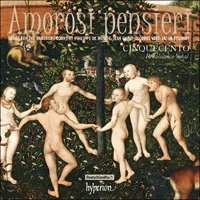Texte paru dans: / Appeared in: |
|
|
|
|
|
Reviewer: J.
F. Weber After seven CDs of sacred music by mostly obscure composers of the 16th century, this vocal ensemble based in Vienna has turned to secular pieces by some of the same composers. The focus remains on the Hapsburg court, the songs grouped by composer in the order listed above. Jacobus Vaet is represented by the only three songs that were printed in his time, included in collections by different publishers. His sacred music has figured on two of the previous discs and on a series of four CDs on another label, of which I received only one, but this is a first hearing of his songs. Jean Guyot de Châtelet is an unfamiliar name; I have only two of his songs (one duplicated here) on a Belgian CD. Jacob Regnart is also known for his sacred music; the only secular music in my collection is five songs directed by Dietrich Knothe on a Berlin CD reissue from Eterna, none duplicated here. Philip de Monte is by far the most important name here. His sacred music appeared on two of the Cinquecento discs, while a disc of his sacred music and eight songs by Laurent Gendre duplicated only one of these songs, a similar disc by the Hilliard Ensemble had four songs not duplicated here, and a Flemish collection by Eric van Nevel included five songs not duplicated here. Hence a real effort has been made to record unfamiliar songs of the period, for I can find only two previous recordings out of 25 songs. Three of the composers were contemporaries, Regnart a generation younger. Their tenures at the Hapsburg court varied in length. Guyot became Kapellmeister in 1563 but was dismissed a year later with the death of Ferdinand I, returning to Liège whence he came. Vaet was appointed by Maximilian II but died three years later. Monte then held the position for over 30 years until his death in 1603. Regnart sang in the chapel under all of these, but never succeeded to the top post as he must have wished. In all of this time the imperial chapel rivaled Munich and Madrid among the European courts. The chronology suggests the reason for Monte’s preeminence on this program. The first song on the program gives the disc its title, typical of a lovesick suitor. Not all the poems are credited, but the poets identified include Guarini, Petrarch, Ronsard, Géroult, Bouchet, and Marot (single examples of each). The six men of this ensemble executed the sacred music of the period superbly, but this disc displays an equivalent command of the style that imbued the secular pieces. The notes are detailed and lucid, commenting on some of the significant aspects of certain songs. This disc will fill out any collection of 16th-century songs. | |
|
|
|
|
|
|
|
Cliquez l'un ou l'autre
bouton pour découvrir bien d'autres critiques de CD |
|




